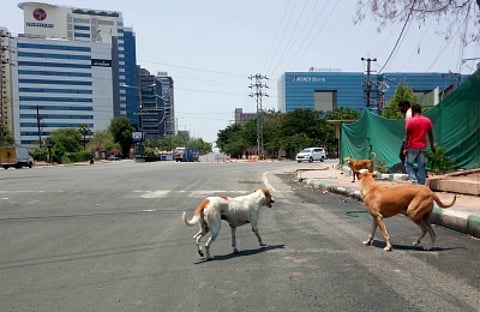India’s top court orders stray dogs to be removed from New Delhi streets
Various estimates put number of strays in New Delhi between 500,000 to one million

NEW DELHI: No stray dogs roaming the streets of New Delhi?
That could be possible in the future after India’s top court ordered authorities in New Delhi to start removing all stray dogs from the streets, and to sterilize and relocate them to shelters permanently.
In its order Monday, the Supreme Court directed the capital’s civic bodies to immediately initiate the process of capturing 5,000 stray dogs from “high-risk areas” for now and send them to shelters equipped with adequate staff and CCTV surveillance within six to eight weeks.
Worrying stats
According to official data from the Municipal Corporation of Delhi, a total of 49 rabies cases were reported in the national capital between January and June this year, news agency PTI reported last month. As many as 35,198 animal bite incidents were reported in the capital during this period.
Rabies, a viral infection primarily transmitted through dog bites, has an extremely high fatality rate and claims nearly 60,000 lives every year. India accounts for 36 per cent of these deaths, according to the World Health Organization.
According to official data from the Municipal Corporation of Delhi, a total of 49 rabies cases were reported in the national capital between January and June this year, news agency PTI reported last month. As many as 35,198 animal bite incidents were reported in the capital during this period.
Animal protection organisations have strongly opposed the Supreme Court’s directive for Delhi-NCR civic authorities to pick up stray dogs and relocate them to shelters, calling the move “impractical and inhumane” for healthy, vaccinated animals.
“The recent Supreme Court order… is a shocking judgment that runs contrary to global public health guidance, India’s own laws, and humane, evidence-based practice,” said Bharati Ramachandran, CEO of Federation of Indian Animal Protection Organisations (FIAPO), a federation of more than 200 animal protection organisations across India.
She called the mass sheltering of healthy, vaccinated dogs “impractical and inhumane”.
It is unclear how the court arrived at the figure of 5,000 stray dogs. Various estimates put the number of strays in New Delhi between 500,000 to one million.
While many of the dogs that roam New Delhi’s streets are harmless, the court’s order aims to control rising dog biting cases, including cases involving children. Some estimates, based on hospital records, suggest New Delhi sees nearly 2,000 dog bite incidents every day.
“The situation is extremely grim,” the court said in its order, adding that it was passed while “keeping (the) larger public interest in mind.”
“Infants, young children should not at any cost fall prey to stray dogs,” it said.
The court also ordered authorities to create an animal helpline within a week so that all dog bite cases in the capital can be reported. It said any individual or organization that stops authorities from removing stray dogs from the streets will face “strict” legal consequences, while adding the strays should not to be released back on streets, in residential areas or in public places.
Animal lovers and activists had earlier opposed the court taking up the case. On Monday, the court chided them too.
“All these animal activists … will they be able to bring back those who have fallen prey to rabies?,” the court asked.
Rabies through dog bites is caused by a virus that invades the central nervous system. If left untreated, it is almost always fatal.
Shortly after the court’s order, a senior minister of the state legislature in Delhi said his government will begin the process of rounding up the strays. Cabinet Minister Kapil Mishra said the court’s order is a step towards freeing New Delhi “from the fear of rabies and stray animals.”
“Special attention will also be given to the comprehensive welfare of stray animals,” Mishra said in a post on X.
Sign up for the Daily Briefing
Get the latest news and updates straight to your inbox


